- Home
- Norman Mailer
The Fight Page 15
The Fight Read online
Page 15
Ferdie Pacheco returned from Foreman’s dressing room. “Everything’s okay,” he stated. “Let’s roll.” In a minute Ali came out of the bathroom with the son of Elijah Muhammad. While he shadowboxed, his manager continued to pray.
“How are things with Foreman?” someone asked Pacheco, and he shrugged. “Foreman’s not talking,” he said. “They got him covered with towels.”
Now the word came down the line from the stadium outside. “Ali in the ring, Ali in the ring.”
Solemnly, Bundini handed Ali the white African robe which the fighter had selected. Then everybody in the dressing room was on their way, a long file of twenty men who pushed and were hustled through a platoon of soldiers standing outside the door and then in a gang’s rush in a full company of other soldiers were racing through the gray cement-brick corridors with their long-gone echoes of rifle shots and death. They emerged into open air, into the surrealistic bliss and green air of stadium grass under electric lights, and a cheer of no vast volume went up at the sight of Ali, but then the crowd had been waiting through an empty hour with no semifinal to watch, just an empty ring, and hours gone by before that with dancers to watch, more dancers, then more tribal dancers, a long count of the minutes from midnight to four. The nation of Zaïre had been awaiting this event for three months, now they were here, some sixty thousand, in a great oval of seats far from that ring in the center of the soccer field. They must be disappointed. Watching the fighters would prove kin to sitting in a room in a housing project studying people through a window in another housing project on the other side of a twelve-lane freeway. The fighters would work under a big corrugated tin shed roof with girders to protect the ring and the twenty-five hundred ringside seats from tropical downpour, which might come at any minute on this night so advanced already into the rainy season. Heavy rains were overdue by two weeks and more. Light rain had come almost every afternoon and dark portentous skies hung overhead. In America that would speak of quick summer storms, but the clouds in Africa were patient as the people and a black whirling smoky sky could shift overhead for days before more than a drop would fall.
Something of the weight of this oncoming rain was in the air. The early night had been full of oppression, and it was hot for so early in the morning, eighty degrees and a little more. Thoughts, however, of the oncoming fight left Norman closer to feeling chill. He was sitting next to Plimpton in the second row from the ring, a seat worth traveling thousands of miles to obtain (although counting two round trips, the figure might yet be twenty-five thousand miles — a barrel of jet lag for the soul). In front of them was a row of wire service reporters and photographers leaning on the apron of the ring; inside the ropes was Ali checking the resin against his shoes, and offering flashes of his shuffle to the study of the crowd, whirling away once in a while to throw a kaleidoscope-dozen of punches at the air in two seconds no more — one-Mississippi, two-Mississippi — twelve punches had gone by. Screams from the crowd at the blur of the gloves. He was all alone in the ring, the Challenger on call for the Champion, the Prince waiting for the Pretender, and unlike other fighters who wilt in the long minutes before the titleholder will appear, Ali seemed to be taking royal pleasure in his undisputed possession of the space. He looked unafraid and almost on the edge of happiness, as if the discipline of having carried himself through the two thousand nights of sleeping without his title after it had been taken from him without ever losing a contest — a frustration for a fighter doubtless equal in impact to writing A Farewell to Arms and then not being able to publish it — must have been a biblical seven years of trial through which he had come with the crucial part of his honor, his talent, and his desire for greatness still intact, and light came off him at this instant. His body had a shine like the flanks of a thoroughbred. He looked fully ready to fight the strongest meanest man to come along in Heavyweight circles in many years, maybe the worst big man of all, and while the Prince stood alone in his ring, and waited out the minutes for the Champion to arrive and had his thoughts, whatever they were, and his private communion with Allah, however that might feel, while he stood and while he shuffled and while he shadowboxed the air, the Lord Privy Seal, Angelo Dundee from Miami, went methodically from ring post to ring post and there in full view of ringside and the stadium just as methodically loosened each of the four turnbuckles on each post which held the tension of each of the four ropes, and did it with a spoke and a wrench he must have put in his little carrying bag back at Nsele and transported on the bus and carried from the dressing room to this ring. And when the ropes were slack to his taste, loose enough for his fighter to lean way back, he left the ring and returned to the corner. Nobody had paid any particular attention to him.
Foreman was still in his dressing room. Later Plimpton learned a detail from his old friend Archie Moore. “Just before going out to the ring, Foreman joined hands with his boxing trust — Dick Sadler, Sandy Saddler, and Archie — in a sort of prayer ritual they had practiced (for every fight) since Foreman became Champion in Jamaica,” Plimpton wrote. “Now they were holding hands again in Zaïre, and Archie Moore, who had his head bowed, found himself thinking that he should pray for Muhammad Ali’s safety. Here’s what he said: ‘I was praying, and in great sincerity, that George wouldn’t kill Ali. I really felt that was a possibility.’ ” So did others.
Foreman arrived in the ring. He was wearing red velvet trunks with a white stripe and a blue waistband. The colors of the American flag girded his middle and his shoes were white. He looked solemn, even sheepish, like a big boy who as Archie said “truly doesn’t know his own strength.” The letters GF stood out in embossed white cloth from the red velvet of his trunks. GF — Great Fighter.
The Referee, Zack Clayton, Black and much respected in his profession, had been waiting. George had time to reach his corner, shuffle his feet, huddle with the trust, get the soles of his shoes in resin, and the fighters were meeting in the center of the ring to get instructions. It was the time for each man to extort a measure of fear from the other. Liston had done it to all his opponents until he met Ali who, then Cassius Clay at the age of twenty-two, glared back at him with all the imperative of his high-destiny guts. Foreman, in turn, had done it to Frazier and then to Norton. A big look, heavy as death, oppressive as the closing of the door of one’s tomb.
To Foreman, Ali now said (as everybody was later informed), “You have heard of me since you were young. You’ve been following me since you were a little boy. Now, you must meet me, your master!” — words the press could not hear at the time, but Ali’s mouth was moving, his head was twelve inches from Foreman’s, his eyes were on the other. Foreman blinked, Foreman looked surprised as if he had been impressed just a little more than he expected. He tapped Ali’s glove in a move equal to saying, “That’s your round. Now we start.”
The fighters went back to their corners. Ali pressed his elbows to his side, closed his eyes and offered a prayer. Foreman turned his back. In the thirty seconds before the fight began, he grasped the ropes in his corner and bent over from the waist so that his big and powerful buttocks were presented to Ali. He flexed in this position so long it took on a kind of derision as though to declare: “My farts to you.” He was still in such a pose when the bell rang.
The bell! Through a long unheard sigh of collective release, Ali charged across the ring. He looked as big and determined as Foreman, so he held himself, as if he possessed the true threat. They collided without meeting, their bodies still five feet apart. Each veered backward like similar magnetic poles repelling one another forcibly. Then Ali came forward again, Foreman came forward, they circled, they feinted, they moved in an electric ring, and Ali threw the first punch, a tentative left. It came up short. Then he drove a lightning-strong right straight as a pole into the stunned center of Foreman’s head, the unmistakable thwomp of a high-powered punch. A cry went up. Whatever else happened, Foreman had been hit. No opponent had cracked George this hard in years and no sparring partner had d
ared to.
Foreman charged in rage. Ali compounded the insult. He grabbed the Champion around the neck and pushed his head down, wrestled it down crudely and decisively to show Foreman he was considerably rougher than anybody warned, and relations had commenced. They circled again. They feinted. They started in on one another and drew back. It was as if each held a gun. If one fired and missed, the other was certain to hit. If you threw a punch, and your opponent was ready, your own head would take his punch. What a shock. It is like seizing a high-voltage line. Suddenly you are on the floor.
Ali was not dancing. Rather he was bouncing from side to side looking for an opportunity to attack. So was Foreman. Maybe fifteen seconds went by. Suddenly Ali hit him again. It was again a right hand. Again it was hard. The sound of a bat thunking into a watermelon was heard around the ring. Once more Foreman charged after the blow, and once more Ali took him around the neck with his right arm, then stuck his left glove in Foreman’s right armpit. Foreman could not start to swing. It was a nimble part of the advanced course for tying up a fighter. The referee broke the clinch. Again they moved through invisible reaches of attraction and repulsion, darting forward, sliding to the side, cocking their heads, each trying to strike an itch to panic in the other, two big men fast as pumas, charged as tigers — unseen sparks came off their moves. Ali hit him again, straight left, then a straight right. Foreman responded like a bull. He roared forward. A dangerous bull. His gloves were out like horns. No room for Ali to dance to the side, stick him and move, hit him and move. Ali went back, feinted, went back again, was on the ropes. Foreman had cut him off. The fight was thirty seconds old, and Foreman had driven him to the ropes. Ali had not even tried to get around those outstretched gloves so ready to cuff him, rough him, break his grace, no, retreating, Ali collected his toll. He hit Foreman with another left and another right.
Still a wail went up from the crowd. They saw Ali on the ropes. Who had talked of anything but how long Ali could keep away? Now he was trapped, so soon. Yet Foreman was off his aim. Ali’s last left and right had checked him. Foreman’s punches were not ready and Ali parried, Ali blocked. They clinched. The referee broke it. Ali was off the ropes with ease.
To celebrate, he hit Foreman another straight right. Up and down the press rows, one exclamation was leaping, “He’s hitting him with rights.” Ali had not punched with such authority in seven years. Champions do not hit other champions with right-hand leads. Not in the first round. It is the most difficult and dangerous punch. Difficult to deliver and dangerous to oneself. In nearly all positions, the right hand has longer to travel, a foot more at least than the left. Boxers deal with inches and half-inches. In the time it takes a right hand to travel that extra space, alarms are ringing in the opponent, counterattacks are beginning. He will duck under the right and take off your head with a left. So good fighters do not often lead with their right against another good fighter. Not in the first round. They wait. They keep the right hand. It is one’s authority, and ready to punish a left which comes too slowly. One throws one’s right over a jab; one can block the left hook with a right forearm and chop back a right in return. Classic maxims of boxing. All fight writers know them. Off these principles they take their interpretation. They are good engineers at Indianapolis but Ali is on his way to the moon. Right-hand leads! My God!
In the next minute, Ali proceeded to hit Foreman with a combination rare as plutonium: a straight right hand followed by a long left hook. Spring-zing! went those punches, bolt to the head, bolt to the head; each time Foreman would rush forward in murderous rage and be caught by the neck and turned. His menace became more impressive each time he was struck. If the punches maddened him, they did not weaken him. Another fighter would be staggering by now. Foreman merely looked more destructive. His hands lost no speed, his hands looked as fast as Ali’s (except when he got hit) and his face was developing a murderous appetite. He had not been treated so disrespectfully in years. Lost was genial George of the press conferences. His life was clear. He was going to dismember Ali. As he kept getting hit and grabbed, hit and grabbed, a new fear came over the rows at ringside. Foreman was awesome. Ali had now hit him about fifteen good punches to the head and not been caught once in return. What would happen when Foreman finally hit Ali? No Heavyweight could keep up the speed of these moves, not for fourteen more rounds.
But then the first was not even over. In the last minute, Foreman forced Ali to the ropes, was in on him, broke loose, and smashed a right uppercut through Ali’s gloves, then another. The second went like a spear through the top of Ali’s skull. His eyes flew up in consternation, and he grabbed Foreman’s right arm with his left, squeezed it, clung to it. Foreman, his arm being held, was still in a mood to throw the good right again, and did. Four heavy half-smothered rights, concussive as blows to the heavy bag, went up to the head, then two down to the body, whaling on Ali even as he was held, and it was apparent these punches hurt. Ali came off the ropes in the most determined embrace of his life, both gloves locked around the back of Foreman’s neck. The whites of Ali’s eyes showed the glaze of a combat soldier who has just seen a dismembered arm go flying across the sky after an explosion. What kind of monster was he encountering?
Foreman threw a wild left. Then a left, a right, a left, a left and a right. Some to the head, some to the body, some got blocked, some missed, one collided with Ali’s floating ribs, brutal punches, jarring and imprecise as a collision at slow speed in a truck.
With everybody screaming, Ali now hit Foreman with a right. Foreman hit him back with a left and a right. Now they each landed blows. Everybody was shaking their head at the bell. What a round!
Now the press rows began to ring with comment on those right-hand leads. How does Ali dare? A magnificent round. Norman has few vanities left, but thinks he knows something about boxing. He is ready to serve as engineer on Ali’s trip to the moon. For Ali is one artist who does not box by right counter to left hook. He fights the entirety of the other person. He lives in fields of concentration where he can detect the smallest flicker of lack of concentration. Foreman has shown himself a lack of quiver flat to the possibility of a right. Who before this had dared after all to hit Foreman with a right? Of late his opponents were afraid to flick him with a jab. Fast were Foreman’s hands, but held a flat spot of complacency before the right. He was not ready for a man to come into the ring unafraid of him. That offered its beauty. But frightening. Ali cannot fight every round like this. Such a pace will kill him in five. Indeed he could be worried as he sits in the corner. It has been his round, but what a force to Foreman’s punches. It is true. Foreman hits harder than other fighters. And takes a very good punch. Ali looks thoughtful.
There is a sound box in the vicinity, some small loudspeaker hooked into the closed circuit, and on it Norman can hear David Frost, Jim Brown, and Joe Frazier talking between rounds, an agreeable sense of detachment thereby offered for they are on the other side of the press rows. Listening to them offers the comfort of a man watching a snowstorm from his fireplace. Jim Brown may have said last night that Ali had no chance, but Brown is one athlete who will report what he sees. “Great round for Muhammad Ali,” he comments. “He did a fantastic job, although I don’t think he can keep up this pace.”
Sullenly, Joe Frazier disagrees. “Round was even … very close.”
David Frost: “You wouldn’t call that round for Ali?”
Joe is not there to root Ali home, not after Ali called him ignorant. “It was very close. Ali had two or three good shots to the face while George been landing body shots.”
Foreman sits on his stool listening to Sadler. His face is bemused as if he has learned more than he is accustomed to in the last few minutes and the sensation is half agreeable. He has certainly learned that Ali can hit. Already his face shows lumps and welts. Ali is also a better wrestler than any fighter he has faced. Better able to agitate him. He sits back to rest the sore heat of his lungs after the boil of his fury in the last r
ound. He brings himself to smile at someone at ringside. The smile is forced. Across the ring, Ali spits into the bowl held out for him and looks wide awake. His eyes are as alive as a ghetto adolescent walking down a strange turf. Just before the bell, he stands up in his corner and leads a cheer. Ali’s arm pumps the air to inspire the crowd, and he makes a point of glowering at Foreman. Abruptly, right after the bell, his mood takes a change.
As Foreman comes out Ali goes back to the ropes, no, lets himself be driven to the corner, the worst place a fighter can be, worst place by all established comprehension of boxing. In the corner you cannot slip to the side, cannot go backward. You must fight your way out. With the screech that comes up from a crowd when one car tries to pass another in a race, Foreman was in to move on Ali, and Ali fought the good rat fight of the corner, his gloves thrown with frantic speed at Foreman’s gloves. It became something like a slapping contest — of the variety two tall kids might show when trying to hit the other in the face. It is far from orthodox practice, where you dart out of a corner, duck out of a corner, or blast out. Since Ali kept landing, however, and Foreman did not, George retreated in confusion as if reverting to memories of fights when he was ten years old and scared — yes, Ali must have made some psychological choice and it was well chosen. He got out of the corner and held Foreman once again by the head in a grip so well applied that Foreman had the pensive expression of a steer being dogged to the ground by a cowboy.
Once the referee separated them, Ali began to back up across the ring. Foreman was after him throwing fast punches. “Show him,” George’s corner must have instructed, “that your gloves are as fast as his.” Suddenly Foreman hit Ali with a straight hard right. Ali held on to Foreman to travel through the shock. After the fight he would say that some of Foreman’s punches went right down to his toes, and this must have been one of them. When the fighters were separated, Foreman chased Ali to the ropes, and Ali pulled out a new trick, his full inch and a half of reach. He held his arms in Foreman’s face to keep him off. The round was almost a minute gone before Ali got in his first good punch, another right. But Foreman charged him and pushed him, driving down on Ali’s gloves with his own gloves, stalking him back and back again, knocking Ali’s gloves away when he didn’t like the character of their moves. Foreman was beginning to dictate how the fight should be. If a bully, he was a master bully. He did not react to the dictation of others, liked his own dictation. The force he sought in serenity had locked him on a unilinear road; it was working now. Ali kept retreating and Foreman caught him again. Hard! Once more, Ali was holding on with both hands, back of the neck, back of the bicep, half writhing and half riding with the somewhat stifled punches Foreman kept throwing. Foreman had begun to dominate the action to the point where Ali’s best course seemed to be obliged to take what was left of each punch after the attempt to smother it. He kept trying to wrestle Foreman to a stop.

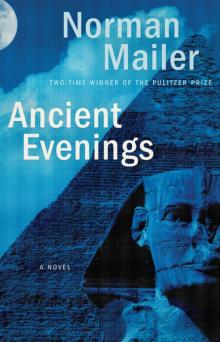 Ancient Evenings
Ancient Evenings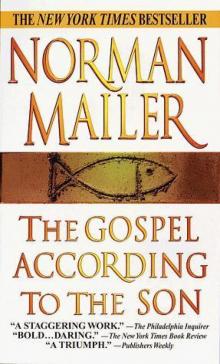 The Gospel According to the Son
The Gospel According to the Son Oswald's Tale: An American Mystery
Oswald's Tale: An American Mystery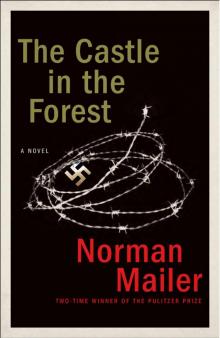 The Castle in the Forest
The Castle in the Forest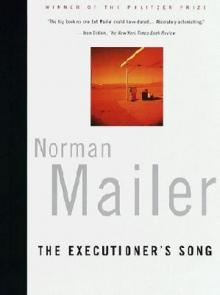 The Executioner's Song
The Executioner's Song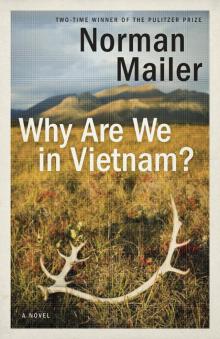 Why Are We in Vietnam?
Why Are We in Vietnam?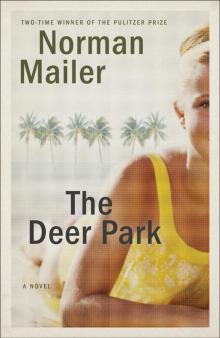 The Deer Park: A Play
The Deer Park: A Play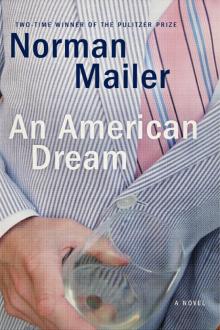 An American Dream
An American Dream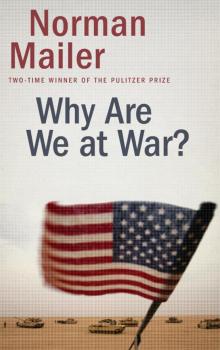 Why Are We at War?
Why Are We at War?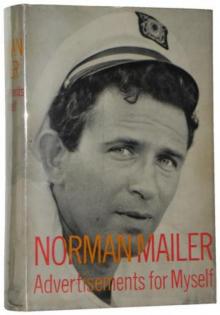 The Time of Her Time
The Time of Her Time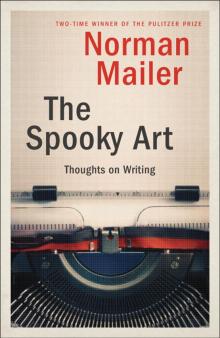 The Spooky Art: Thoughts on Writing
The Spooky Art: Thoughts on Writing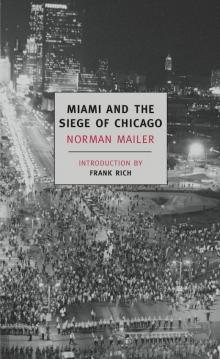 Miami and the Siege of Chicago
Miami and the Siege of Chicago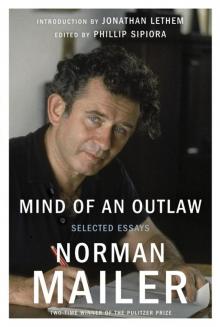 Mind of an Outlaw: Selected Essays
Mind of an Outlaw: Selected Essays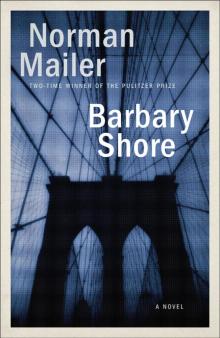 Barbary Shore
Barbary Shore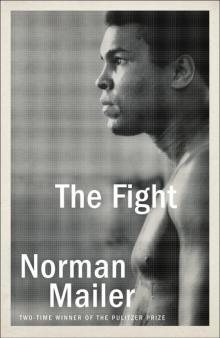 The Fight
The Fight Harlot's Ghost
Harlot's Ghost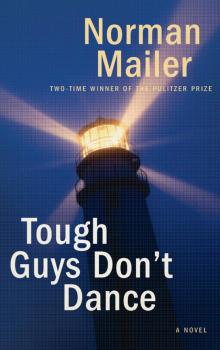 Tough Guys Don't Dance
Tough Guys Don't Dance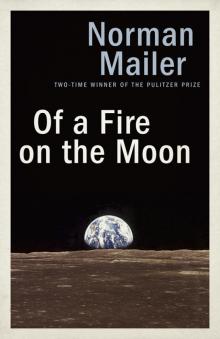 Of a Fire on the Moon
Of a Fire on the Moon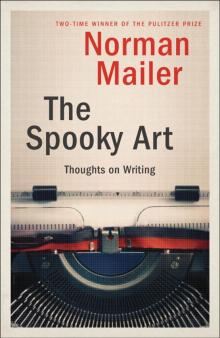 The Spooky Art
The Spooky Art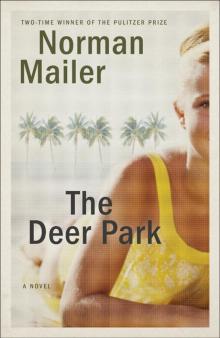 The Deer Park
The Deer Park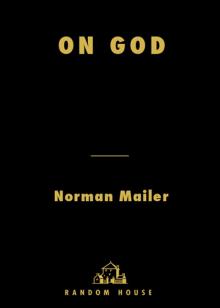 On God: An Uncommon Conversation
On God: An Uncommon Conversation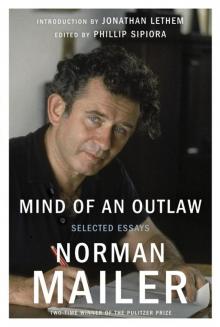 Mind of an Outlaw
Mind of an Outlaw Oswald's Tale
Oswald's Tale